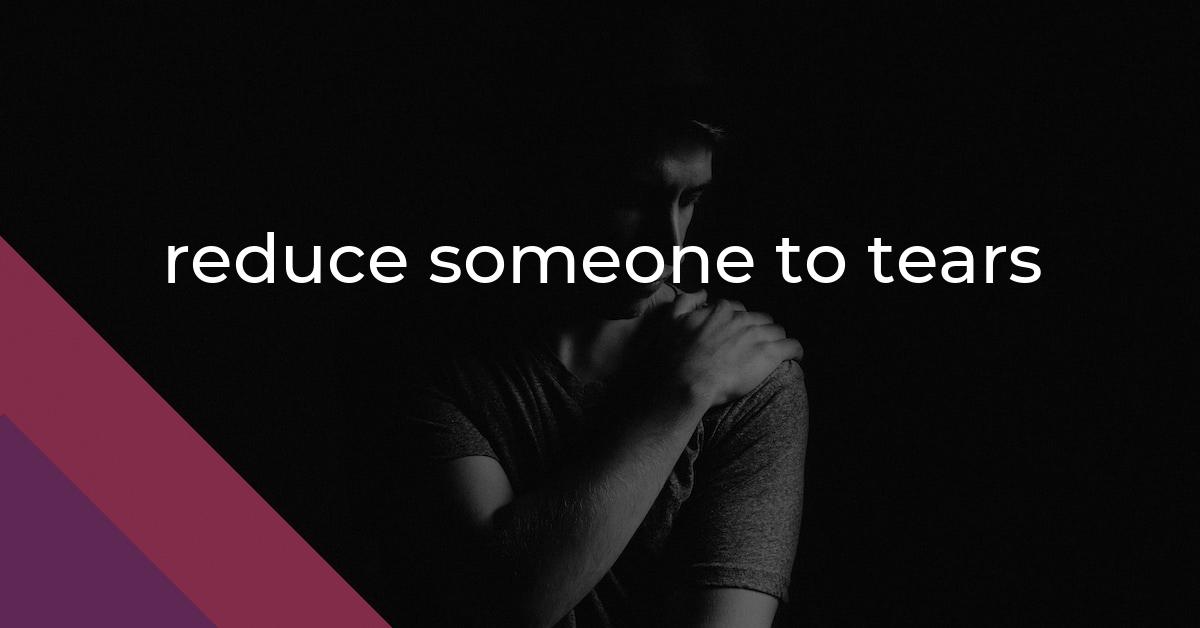reduce someone to tears: Idiom Meaning and Origin
What does ‘reduce someone to tears’ mean?
The idiom "reduce someone to tears" means to make someone cry or become extremely upset.

Idiom Explorer
To "scare someone to death" means to frighten someone so severely that it causes them extreme fear or shock.
The idiom "run someone ragged" means to exhaust or wear someone out completely.
The idiom "rip to shreds" means to criticize or dismantle something or someone in a vehement and forceful manner.
The idiom "rend one's garments" means to express extreme sorrow, grief, or distress by tearing one's clothes apart forcefully. This action is often done as a cultural or religious expression of anguish or despair.
The idiom "read someone to filth" means to criticize or insult someone harshly and thoroughly.
The idiom "raise someone's hackles" means to make someone very angry or annoyed.
The idiom "pipe the eye" means to shed tears or cry, often due to sadness or emotional distress.
Emotional Overwhelm
The idiom "reduce someone to tears" is a well-known expression in the English language. It is often used to describe a situation where a person becomes extremely emotional and starts crying. The phrase suggests that something has had such a profound impact on someone that their emotions have overwhelmed them to the point of tears.
When someone is "reduced to tears," it implies that an event, a remark, or a situation has deeply affected them on an emotional level. It suggests that the person's emotional resilience has been weakened, resulting in an outpouring of tears. The phrase can be used to describe a wide range of emotions, including sadness, frustration, anger, or even extreme joy.
The idiom "reduce someone to tears" is frequently used in various contexts, such as describing a heart-wrenching movie or a deeply moving piece of music. It can also be used when recounting personal experiences or describing the impact of a particular event on an individual's emotions.
While the exact origin or earliest usage of this expression is unclear, it is commonly used in both spoken and written English. It is a figurative phrase that does not imply the actual act of physically reducing someone to tears, but rather refers to the emotional state of an individual.
It is important to note that the idiom is not to be taken literally. It is a metaphorical expression that highlights the impact a particular experience or circumstance can have on an individual's emotional state. The phrase is often used in storytelling, literature, and everyday conversations to vividly depict the intensity of an emotional response.
The idiom "reduce someone to tears" is a powerful expression that captures the profound emotional impact a person can experience. It conveys the idea that something has deeply affected an individual, resulting in an outpouring of tears. While its exact origin and earliest usage may remain uncertain, the phrase continues to be widely used in the English language to vividly depict the intensity of emotional responses.
The idiom "move someone to tears" is closely related to "reduce someone to tears." Both idioms describe situations where emotions become overwhelming and result in tears. However, "move someone to tears" suggests a slightly different emotional response. It conveys the idea that something has touched a person deeply and evoked an emotional reaction leading to tears. This can be a powerful film scene, a heartfelt speech, or a particularly moving piece of music.
The idiom "make the bald man cry" is another related expression. Although it may seem unrelated at first glance, it shares a similar meaning to "reduce someone to tears." "Make the bald man cry" is an informal way of saying that something is so heartbreaking or emotionally powerful that it can make even the toughest person cry. The reference to a "bald man" is simply a playful addition to the expression, emphasizing the idea that the emotional impact is so strong it can affect anyone, regardless of their outward appearance or perceived toughness.
The idiom "make the bald man cry" is often used colloquially in conversations or anecdotes to highlight the immense emotional power of a particular experience, whether it be a heart-wrenching story, a tear-jerking movie, or a deeply moving piece of art. Like "reduce someone to tears," it illustrates the intensity of emotional responses and the profound impact certain events can have on individuals.
The idiom "reduce someone to tears" is a widely used expression in the English language that describes a situation where someone becomes extremely emotional and starts crying. It highlights the profound impact that an event or circumstance can have on an individual's emotional state. The related idioms "move someone to tears" and "make the bald man cry" further explore the range of emotions and the powerful reactions that certain experiences can evoke. These idioms add depth and variety to the language we use to describe human emotions and the impact of different situations on individuals.
Example usage
Examples:
- When the teacher yelled at him in front of the whole class, it reduced him to tears.
- The movie was so emotional that it reduced many audience members to tears.
- The harsh criticism from her boss reduced her to tears.
More "Emotions" idioms



